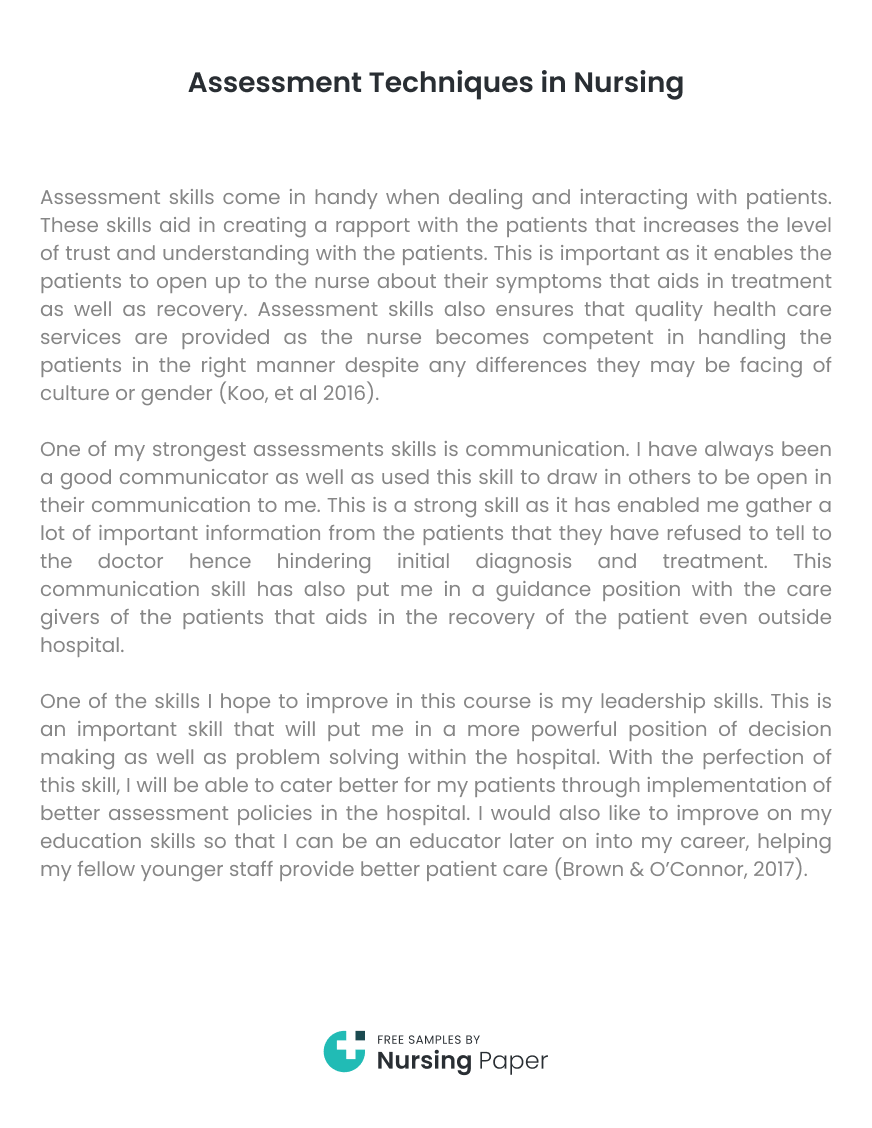
Assessment Techniques in Nursing
Introduction
Assessment skills come in handy when dealing and interacting with patients. These skills aid in creating a rapport with the patients that increases the level of trust and understanding with the patients. This is important as it enables the patients to open up to the nurse about their symptoms that aids in treatment as well as recovery. Assessment skills also ensures that quality health care services are provided as the nurse becomes competent in handling the patients in the right manner despite any differences they may be facing of culture or gender (Koo, et al 2016).
The Body
One of my strongest assessments skills is communication. I have always been a good communicator as well as used this skill to draw in others to be open in their communication to me. This is a strong skill as it has enabled me gather a lot of important information from the patients that they have refused to tell to the doctor hence hindering initial diagnosis and treatment. This communication skill has also put me in a guidance position with the care givers of the patients that aids in the recovery of the patient even outside hospital.


One of the skills I hope to improve in this course is my leadership skills. This is an important skill that will put me in a more powerful position of decision making as well as problem solving within the hospital. With the perfection of this skill, I will be able to cater better for my patients through implementation of better assessment policies in the hospital. I would also like to improve on my education skills so that I can be an educator later on into my career, helping my fellow younger staff provide better patient care (Brown & O’Connor, 2017).
1. Brown, K. & O’Connor, W. (2017). Physical Assessment Techniques in Nursing Education: A Replicated Study. Journal of Nursing Education, 56(5), 287-291.
2. Koo, L., Horowitz, A., Radice, S., Wang, M. & Kleinman, D. (2016). Nurse Practitioners’ Use of Communication Techniques: Results of a Maryland Oral Health Literacy Survey. PLOS One. Retrieved from http://journals.plos.org/plosone/article?id=10.1371/journal.pone.0146545



The download will start shortly.

The download will start shortly.
 Subject:
Health and Social Care
Subject:
Health and Social Care  Number of pages: 10
Number of pages: 10  Subject:
Nursing
Subject:
Nursing  Number of pages: 2
Number of pages: 2  Subject:
Health and Social Care
Subject:
Health and Social Care  Number of pages: 5
Number of pages: 5  Subject:
Medicine
Subject:
Medicine  Number of pages: 2
Number of pages: 2  Subject:
Health and Social Care
Subject:
Health and Social Care  Number of pages: 6
Number of pages: 6  Subject:
Nursing
Subject:
Nursing  Number of pages: 3
Number of pages: 3  Subject:
Health and Social Care
Subject:
Health and Social Care  Number of pages: 3
Number of pages: 3  Subject:
Medicine
Subject:
Medicine  Number of pages: 3
Number of pages: 3  Subject:
Health and Social Care
Subject:
Health and Social Care  Number of pages: 2
Number of pages: 2  Subject:
Health and Social Care
Subject:
Health and Social Care  Number of pages: 2
Number of pages: 2  Subject:
Health and Social Care
Subject:
Health and Social Care  Number of pages: 3
Number of pages: 3  Subject:
Medicine
Subject:
Medicine  Number of pages: 6
Number of pages: 6  Subject:
Health and Social Care
Subject:
Health and Social Care  Number of pages: 6
Number of pages: 6  Subject:
Nursing
Subject:
Nursing  Number of pages: 2
Number of pages: 2  Subject:
Health and Social Care
Subject:
Health and Social Care  Number of pages: 8
Number of pages: 8 
